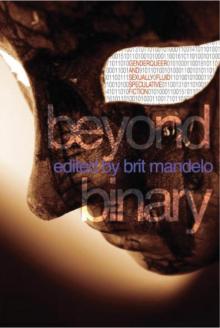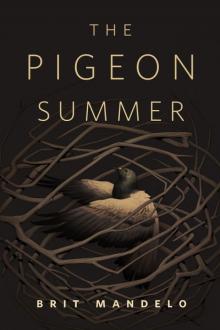- Home
- Brit Mandelo
The Pigeon Summer Page 2
The Pigeon Summer Read online
Page 2
Si walked to the door and put a hand on the knob. Hir fingers shook. Hir guts cramped—equal measures hunger and terror. There were, of course, people down that narrow staircase. There would be more at the grocery, and more at the checkout, and yet more on the walk back. Each would have their own manners of seeing and judging, their brief cruelties and petty aggressions. With C., there were certain possibilities: a reckless bravado, a bolstering effect—the crowd of two, ready to put backs together and fight. C. knew hir and needed hir, would be there to the end, no matter bodies or pronouns or the harshness of strangers. Alone, J. was—si let go of the knob and banged hir head twice on the door—vulnerable. The shape and not-shape of hir had mattered less, before. Before, si had armor. Before, si hadn’t felt raw as bone and dangerously visible.
But this was now.
Si picked up the box of cereal and poured a glass of water from the tap, then went to sit by the window. The pigeon babies, grown plump, cooed and twittered at each other and their parent. The three of them could no longer all fit in the nest together. J. ate fistfuls of the dry cereal, washing them down with lukewarm, iron-tasting water. Dear Cordelia, si thought, I am fucking terrified.
* * *
J. paced, slept, ate the dwindling box of cereal to quiet an aching stomach. Life had come down to those simple but ineffably complicated behaviors, and the ticking of a phantom clock, the pressure of a phone that held more and more unanswered messages juxtaposed against the frightful silence of the void. In hir bones si felt it, the coming to a close.
The ghost had been neglectful, invisible; the pigeons were growing to look like their parent, no longer so devastatingly helpless and delicate. The rent would be due soon. The food was nearly gone. C. was still as dead as he’d been weeks before, and would be for the rest of the weeks in the world.
Footsore and stiff from pacing tight cage-circles for hours, J. sat down to the red sun of evening in the chair by the window, notebook balanced open to a fresh page on hir knee. Si took in the stifling warm air of the apartment in one long inhale; let it out slowly. The city, their city, moved through life below.
Dear Cordelia,
If you were the real C.’s ghost, there would be some things I’d want to tell you. Some things that need to get said, I guess—I feel like doing it now.
So:
Dear C.,
I should have said it more, that I loved you. I should have said it into the stupid mess of your hair when we sobered up at dawn in the backseat of your car. I should have made you understand what I would have sworn to fucking god you did understand: without each other we’ve got nothing, because you’re the whole world and all I wanted out of it.
You left me.
You made some promises, to me, and you broke them.
I don’t care. If I could have you back for five minutes, just five forever, so I could say goodbye—it wouldn’t be enough but it would be something. It wouldn’t be my stupid text “sup” and you not responding. It wouldn’t be almost blacking out at your funeral and your fucking parents not caring, not understanding, that I had lost half of me.
I miss you. I miss you. I miss you. You heartless fuck.
I don’t know how to go on, how to go do the shit we should be doing together—you should be in this apartment with me, crammed into that tiny bathroom in the morning and maybe having to get a second bed or just a bigger one we could share or whatever felt all right.
Nobody else had to get us, what we were for each other. I thought you thought it was funny, when kids couldn’t decide to call us faggots or what. I got us. I thought you did.
You should have thought of me.
What would you tell me to do, without you? Couldn’t even leave me a fucking note.
I loved you.
J. trailed off, silence overtaking the scritch of pen on paper, and heaved a chest-cracking breath. It felt as if the ink had crawled up from hir guts and ripped free onto the page, splattered there in a horror show of anger and need and pain. This was what it was like, in words—insufficient, flat, a belly-shaking cry distilled into a page of symbols. This was what it was like to yank at the edges of the gash and look at the insides.
It, si thought, hurts.
Yours, J.
* * *
The ticklish swipe of a hand brushing hair back from J.’s face woke hir to wide white cracks of lightning in the outside sky and the sound of thunder. Si froze, one hand clutching the pillow, as the nearly imperceptible touch skated across hir scalp, ruffling bed-wild hair and smoothing a hank of it away from hir face. Hir heart raced. The ghost—silent for days, more figment than phantom—had been stroking hir head.
This was not a handprint on a mirror.
It was less eerie than si would have expected, more of a comfort. Si waited a moment for another touch, amidst the thunder’s rumbling, then, when none seemed forthcoming, climbed out of bed and went to the window. Si looked out on the rain-washed street through the distortions of wet glass. Realized that the ever-present nest to the right on the ledge had only two occupants—and one was the adult—struck by the blaze of an arc of lightning from the sky. J.’s stomach dropped. The wind howled outside; the two birds huddled close together through the deluge. “Shit,” si whispered.
The chick must have fallen out. Si wasn’t sure how long it took pigeons to fledge; they looked big, but si didn’t know enough to judge. What if it was lying on the ground below, trapped in the runoff water, cold and alone? The constriction in hir chest tightened inch by inch. Si threw on a pair of sneakers and a sweatshirt, shivering with adrenaline, and leapt to the door. There si balked, drawn up short. The knob was cold in the warm room, somehow, as if a chill hand had held it moments before—one equally as incorporeal and helpless to open the thing as si felt in this moment. Outside was outside. Si ground hir teeth hard enough to ache. Hir metaphorical clock had stopped ticking, all hands pointing to midnight.
Si turned the knob and clattered down the dark staircase, opening the metal door at the bottom onto the courtyard. The rain hissed down in sheets. Si ducked into it, head down and hands up to shade hir eyes; the downpour was cold, soaking hir to the skin in an instant. Si traced the back side of the building along the garden row with the shop owner’s flowers flattened and jerking under the assault of the wind and rain. Each step si took without finding the little bird was like a blow to the ribs.
It mattered. Si absorbed that knowledge while searching, water sloshing into hir shoes to freeze hir toes. It mattered whether or not si found the pigeon, whether or not it was all right. This was an individual act si had to perform to assure the continuation of some particular small world.
Then, beneath a brambly bush that was doing nothing to protect it, si found the palm-sized bird, scrunched miserably into itself, as tiny as it could become. “Ssh,” J. whispered, bending down and taking a knee to reach it. It did not respond to hir looming close; its eyes remained closed. When hir fingers gently closed around its warm, thrumming body, it struggled as if to flap away, but si held it tenderly. Hunching over and holding the bird close to hir chest, si struggled back to the stairs and inside the building.
The sudden cessation of rain was like surfacing from drowning. Si wanted to gasp for breath but held the urge so as not to frighten the bird quivering in hir hands. Si bumped the door shut with hir hip and walked up the stairs to the studio. Water trailed behind the pair, pooling under J. as si stopped inside the doorway. Si slopped across the room to the pile of clean laundry and, trembling with uncertainty, sat the pigeon there, opening hir hands slowly to release it. The bird flapped, agitated, and kicked at the old shirts for a moment. J. stepped back and it made a quiet noise that seemed thankful in the dark night, settling in.
J. stood in the center of the room, goose-bump-spangled and soaking, and there: the soft weight of fingers resting on hir shoulder, the lightest grip of reassurance, silent and small and whisper-faint. Si closed hir eyes against tears, thought of the letters si’d written, and kne
w it didn’t matter who had received them—just that, impossibly, someone had. The touch dissipated from one breath to the next, and si felt the wet and cold again, moved to strip off the sweatshirt, jeans, shoes, underclothes, each layer a weight and a symbol. Si lay down damp on the still-sleep-warm sheets, then shifted, head to the foot of the bed, and pillowed hir chin on hir arms to watch the pigeon. It slept, bird-sized breaths making its body rise and fall.
One small world, one inexplicable life.
“Thank you,” si whispered, not entirely alone.
* * *
In the morning, si opened the window onto the beginnings of a crisp, clean-breezy summer day. Stealthily, si approached the pigeon and took it up, shirt and all, in loose hands; more than the night before, it rustled and fought. Hir heart fluttered like its trapped wings as si approached the window and leaned out, hip on the sill, to reach for the nest where the sibling bird rested. Si waited until the pigeon quieted slightly then opened hir grip a fraction at a time. It hopped onto the ledge, wobbled for a breath-stealing moment, and stepped into its nest again.
The fist-clenched tightness in J.’s chest eased, bit by bit, like hir own hands. Si closed the window and sat down in the chair to take up the notebook. Si wrote briefly:
Dear Cordelia,
The pigeons are okay.
—J.
After a long moment, si leaned over and picked up the phone from the bedside table to scroll through the message box. C.’s name, there, and si knew what was in the thread: laughter, light, loneliness. Instead, si flicked up to hir own unanswered texts and messages. Hir thumb tapped, deliberate and trembling, “return call.”
About the Author
Brit Mandelo is a Louisville native and lives there with her partner in an apartment that doesn’t have room for all the books. She is the author of The Finite Canvas, among other works. In the time left between her day job selling books and writing, she’s a student at the University of Louisville. You can sign up for email updates here.
Thank you for buying this
Tom Doherty Associates ebook.
To receive special offers, bonus content,
and info on new releases and other great reads,
sign up for our newsletters.
Or visit us online at
us.macmillan.com/newslettersignup
For email updates on the author, click here.
Contents
Title Page
Copyright Notice
Begin Reading
About the Author
Copyright
Copyright © 2016 by Brit Mandelo
Art copyright © 2016 by Ashley Mackenzie

 Beyond Binary
Beyond Binary The Pigeon Summer
The Pigeon Summer